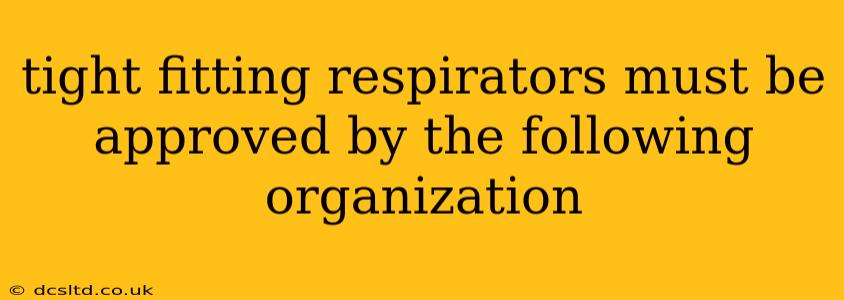Tight-Fitting Respirators: Understanding Approval and Certification
Choosing the right respirator is critical for protecting your respiratory health in hazardous environments. When it comes to tight-fitting respirators, understanding the approval process and certifying organizations is paramount. This is because these respirators create a seal against your face, and improper fit or an unapproved model can significantly compromise their protective capabilities. This article will clarify which organization approves tight-fitting respirators and answer some frequently asked questions.
Which Organization Approves Tight-Fitting Respirators?
In the United States, the National Institute for Occupational Safety and Health (NIOSH) approves tight-fitting respirators. NIOSH, part of the Centers for Disease Control and Prevention (CDC), sets the standards and tests respirators to ensure they meet specific performance requirements. They don't actually approve respirators in the sense of granting individual permission, but instead certify them through a rigorous testing and evaluation process. A respirator that passes NIOSH testing receives a certification mark, indicating that it meets their standards for safety and effectiveness.
What Does NIOSH Certification Mean?
NIOSH certification means the respirator has undergone extensive testing to prove its ability to filter out specific airborne contaminants at a defined level of protection. This includes tests for filtration efficiency, fit, and resistance to breathing. The certification ensures that the respirator meets the minimum requirements for protecting the wearer from harmful substances. The certification mark, usually found on the respirator itself and its packaging, provides crucial information about its capabilities and limitations.
How Can I Identify a NIOSH-Approved Respirator?
Look for the NIOSH approval label on the respirator's packaging and the respirator itself. This label will have an approval number and will indicate the type of respirator and the contaminants it is designed to protect against. Be wary of respirators without this certification, as they may not offer the level of protection they claim. Always ensure that the respirator is the correct size and fits properly to achieve an effective seal.
What Types of Respirators Require NIOSH Approval?
NIOSH approval is essential for all tight-fitting respirators, including:
- Half-mask respirators: These cover the nose and mouth.
- Full-face respirators: These cover the entire face.
- Powered Air-Purifying Respirators (PAPRs): These use a powered fan to draw air through a filter.
While some loose-fitting respirators may also have NIOSH approvals, it's the tight-fitting respirators that require stringent testing and certification due to their reliance on a tight seal for effectiveness.
Are there different levels of NIOSH approval?
Yes, NIOSH approval levels indicate the respirator's effectiveness against different types of hazards. Respirators are categorized based on their ability to filter out specific particles and gases. The labeling system clearly shows which hazards the respirator is designed to protect against. This information is crucial for selecting the right respirator for the specific work environment.
Where can I find more information about NIOSH-approved respirators?
You can find a comprehensive list of NIOSH-certified respirators and more detailed information about their certification process on the NIOSH website. This is an excellent resource for making informed choices about your respiratory protection. Remember, selecting the right respirator is a critical step in ensuring worker safety.
Disclaimer: This information is for educational purposes only and does not constitute professional advice. Always consult with a safety professional to determine the appropriate respirator for your specific needs and working conditions.
